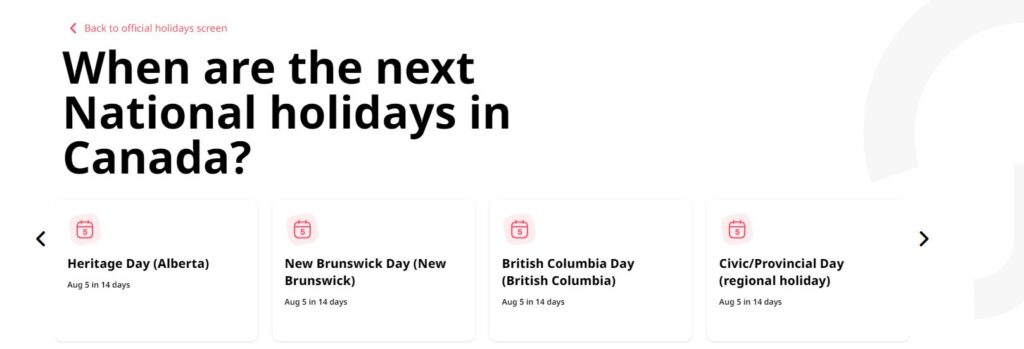Table of Contents
ToggleCivic Holiday 2026, observed on the first Monday of August, is a significant event in Canada that allows citizens to enjoy a long weekend filled with festivities, relaxation, leave management, and community activities. Civic Holiday 2026 will fall on August 3th, providing Canadians with a much-needed mid-summer break. Though it is not a statutory holiday across the country, it holds considerable cultural and social importance, with various provinces and municipalities recognizing and celebrating it in unique ways.
Civic Holiday is not a statutory holiday across Canada, and its recognition varies by province and territory. This means that for many workers and students, whether or not they get the day off depends on where they live. Here’s a detailed breakdown:

What is Civic Holiday?
The Civic Holiday is observed on the first Monday of August. It has various names and regional traditions, including:
British Columbia Day in British Columbia
New Brunswick Day in New Brunswick
Saskatchewan Day in Saskatchewan
Heritage Day in Alberta
Natal Day in parts of Nova Scotia
And simply “Civic Holiday” in territories like the Northwest Territories and Nunavut.
Originally introduced in the late 19th century (for example, Toronto city council did so in 1875) as a summer holiday, it has evolved into a long weekend that Canadians use for travel, relaxation, and community-events.
When and Where is It Observed in 2026?
Because the Civic Holiday is a provincial/territorial matter rather than a federal holiday, its status varies by region. Here’s a breakdown:
Provinces / Territories where it is a statutory holiday in 2026
British Columbia: August 3, 2026 (observed as British Columbia Day)
New Brunswick: August 3, 2026 (New Brunswick Day)
Saskatchewan: August 3, 2026 (Saskatchewan Day)
Northwest Territories: August 3, 2026 (Civic Holiday)
Nunavut: August 3, 2026 (Civic Holiday)
Provinces / Territories where it is observed, but not always statutory
Ontario: August 3, 2026, marked as “Civic Holiday (optional/municipal)”. Businesses often close, but it depends.
Alberta: August 3, 2026, known as Heritage Day, is often observed but may not guarantee work-free for everyone.
Nova Scotia: August 3, 2026, Natal Day in many municipalities, often celebrated but not always a full statutory holiday.
Provinces where the first Monday of August is not a formal Civic Holiday
Quebec: The Civic Holiday is not generally recognized; Quebec observes its own distinct holidays.
Yukon: The territory observes Discovery Day on the third Monday of August rather than the first.
Newfoundland and Labrador: It does not formally follow the first Monday in August Civic Holiday pattern; local alternatives may apply.
Impact on Workplaces and Schools
For Workers
In provinces/territories where Civic Holiday is a statutory holiday, most employees are entitled to a paid day off or equivalent holiday pay if they work on that day. For regions where it’s optional or municipal, whether you get the day off depends on your employer and local municipal rules.
For Schools
Since the holiday falls during summer, most schools are already on break and thus not directly affected. However, municipal offices and local events often reflect the day’s observance.
Business Considerations
Companies planning schedules for summer should check local statutory holiday lists to determine eligibility for holiday pay or closures.
Retail, hospitality, and service industries may see higher demand for the long weekend, plan staffing accordingly.
It’s useful to treat the Civic Holiday as a “bridge” into the August long weekend for planning rest, travel, or event coverage.
How It’s Celebrated Across Canada
Festivities vary widely by region, but some common threads emerge:
In Alberta (Heritage Day), there are multicultural festivals, food fairs, and music events highlighting the province’s cultural diversity.
In British Columbia (British Columbia Day), many take advantage of the long weekend for outdoor recreation, hiking, camping, beach outings, and regional fairs.
In New Brunswick (New Brunswick Day) and Saskatchewan (Saskatchewan Day), community picnics, family gatherings, and local celebrations are typical.
In Ontario (Simcoe Day or Civic Holiday), municipalities host parades, historical reenactments, or civic-recognition events (for example, in Toronto or Ottawa).
In Manitoba (Terry Fox Day), the same day, though not officially statutory, charitable runs or remembrances may accompany the weekend.
Together, these celebrations reflect the purpose of the day: a mid-summer pause for community, culture, and refreshment.
Significance of the Holiday
Beyond simply getting a long weekend, Civic Holiday plays a larger role:
It offers a much-needed break during the heart of summer, boosting morale and work-life balance.
It encourages local tourism and supports regional economies as people travel, attend festivals, or stay-cation.
It fosters cultural and historical awareness through community celebrations, heritage recognition, and local traditions.
For employers and HR teams, it provides a natural opportunity to review workforce planning, schedule adjustments, vacation time usage, and ensure alignment with leave policies.
FAQs About Civic Holiday 2026
What date is Civic Holiday in 2026?
Civic Holiday will take place on Monday, August 3, 2026, which is the first Monday of August. It gives Canadians a well-deserved long weekend right in the middle of summer.
Is Civic Holiday a paid day off for everyone in Canada?
No, it isn’t. Whether you get a paid day off depends on the province or territory you live in. Some regions treat it as a statutory holiday, meaning most workers get the day off with pay, while others see it as an optional civic holiday where time off isn’t guaranteed.
How can I find out if I get the day off on Civic Holiday?
Check your employment contract, your company’s policy, or your provincial labour laws. If your province recognizes Civic Holiday as a statutory holiday, you’ll likely have the day off or receive extra pay if you work.
Are businesses required to close on Civic Holiday?
Not always. In provinces where it’s a statutory holiday, many businesses close or operate with reduced hours. In other provinces, it’s up to the employer, some may stay open, especially in retail, hospitality, or essential services.
What happens if I work on Civic Holiday?
If you work in a province where the Civic Holiday is statutory, you’re often entitled to holiday pay (usually time-and-a-half or double pay) or another paid day off later. If it’s not statutory where you live, regular pay rules usually apply unless your company offers extra benefits.
Can my employer deny a request for time off on Civic Holiday?
Yes, if the day isn’t a statutory holiday in your province, your employer can deny a time-off request based on business needs. However, if it’s statutory, they generally have to follow holiday rules, unless your role is essential and requires staffing that day.
How does Civic Holiday affect part-time workers?
Part-time employees can still qualify for holiday pay, but it depends on the province and how many hours they’ve worked recently. Check your provincial employment standards or talk to your HR department to see if you’re eligible.
What should I do if my employer says I have to work, but I think I should have the day off?
Start by reviewing your employment agreement and your province’s list of statutory holidays. If you still believe you’re entitled to the day off or extra pay, contact your local labour standards office for clarification or to file a complaint.
Do retail and restaurant workers get Civic Holiday off?
Not always. Many retail stores, restaurants, and service-industry businesses stay open during Civic Holiday, especially in areas where it’s not statutory. In provinces where it is, those who work may receive premium pay or another paid day off.
Does Civic Holiday affect schools or universities?
Not really, Civic Holiday always falls during the summer break, so schools are already closed. However, families often use the long weekend for road trips, festivals, or local community events.
Conclusion
The Civic Holiday 2026 remains one of Canada’s most anticipated long weekends, giving people across the country a chance to pause, relax, and celebrate their communities. Falling on Monday, August 3, 2026, the day perfectly captures the spirit of summer, bringing families, friends, and neighborhoods together for outdoor adventures, cultural festivals, and heritage celebrations.
However, the way Civic Holiday is recognized varies widely from one province to another. In some regions, such as British Columbia, Saskatchewan, and New Brunswick, it’s treated as a statutory holiday, guaranteeing most employees a paid day off. In others, like Ontario, Manitoba, and Alberta, it is considered a civic observance, meaning time off depends largely on the employer’s policy or local agreements. This difference makes it important for both employees and employers to review their province’s labor standards and company policies to understand whether the day qualifies as paid leave.
